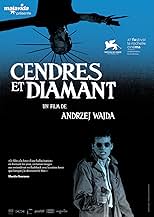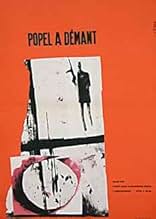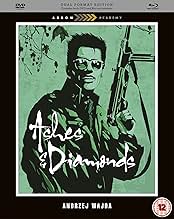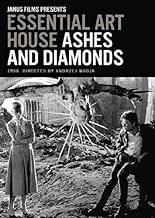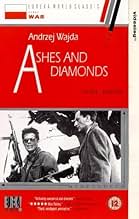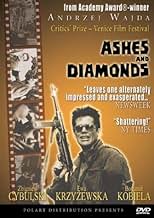Alla fine della seconda guerra mondiale e dell'occupazione tedesca, la resistenza polacca e le forze russe si rivoltano nel tentativo di prendere il comando della Polonia comunista.Alla fine della seconda guerra mondiale e dell'occupazione tedesca, la resistenza polacca e le forze russe si rivoltano nel tentativo di prendere il comando della Polonia comunista.Alla fine della seconda guerra mondiale e dell'occupazione tedesca, la resistenza polacca e le forze russe si rivoltano nel tentativo di prendere il comando della Polonia comunista.
- Regia
- Sceneggiatura
- Star
- Nominato ai 2 BAFTA Award
- 1 vittoria e 2 candidature totali
- Stefka
- (as Barbara Kraftówna)
- Barmaid Lili
- (as Z. Czerwinska)
- Franek Pawlicki
- (as W. Grotowicz)
- Jurgieluszka
- (as I. Orzewska)
- Smolarski
- (as M. Loza)
- Puciatycka
- (as H. Siekierko)
Recensioni in evidenza
The visual composition of the film is as masterful as the complexity of the characters and plot. Despite the notoriously bad film technology in the Soviet states and the constraints of Socialist Realism, the film manages not only to capture the potential richness of black and white, but also manages to avoid the standard pitfalls of over-zealous editing that often destroy other contemporary Soviet films. The frames are longer shots in general, and forced schematization through editing is all but absent. The precise composition of each scene throughout the film provides the visual coherency that would otherwise be imposed by careful editing; as an example, see the scene in which Maciek is underneath the staircase in the lobby of the hotel towards the end of the film, or the final "Polish" dance scene.
I would highly recommend some research into the political transitions of Poland in the years directly following WWI before viewing this film for the first time; this film was made for a particular audience who clearly understood certain cultural and historical references that a modern Western audience will inevitably miss (ie. "Were you in Warsaw?"). The thematic and emotional complexity of the film is also enhanced by an understanding of Polish history. I would highly recommend this film for any class examining Eastern Europe or Soviet Russia (which is the context in which I was introduced to this film in particular), or to anyone who would like to better understand the complexity of Cold War politics from a perspective behind the Iron Curtain.
The film shows the lost youth of Poland struggling to find a way to leave this vicious upbringing and return to a normality which they often didn't ever have.
The film's hero wants to return to being a student and having romances and friends after years of fighting for the Polish underground (this is why he wears sunglasses, because his eyesight was damaged fighting in tunnels during the Warsaw Uprising), however he has a mission to kill a communist officer...
The film is amazing, the imagery reflects the detruction and sorrow of this lost generation. The direction and acting are superb. Like a previous poster, however, I was a little dis-satisfied with the ending, which differed from the book. That is a trivial point, though.
1. Nothing is black or white, everything is just a shade of gray
2. Is death, no matter how you try to justify it, senseless?
3. Is it better to live, while on your knees or die standing straight? Or maybe it's better to try to live standing straight?
4. That sometimes it's not war that is hell, it's living through war and trying to live a normal life that is a lot harder (thank God I do not know if it is so)
Wajda's movie doesn't give direct answers to any of these questions - each person may watch the movie from a different point of view and get to a totally different conclusion. But even if you're not into psychological movies about war, or noir-movies (and Popiol i Diament is definitely a sort of a noir-movie) it's worth watching for just one scene - the burning vodka glasses at the bar - Cybulski at his best.
And lastly - the motto of the movie (and of the book as well):
"Will ash and chaos be left in the end, that follows a storm into abyss Or may a diamond be found in the ash, a dawn of an everlasting victory"
Cyprian Kamil Norwid
PS: I hope Mr Norwid will not turn in his grave at the quality of my translation but that part of a poem by CK Norwid sums up the movie really well.
Lo sapevi?
- QuizQuarto potere (1941) - and Gregg Toland's cinematography in particular - was a huge influence on Andrzej Wajda at the time. Like Toland, the first thing the film's cinematographer Jerzy Wójcik did was convince production designer Roman Mann to include ceilings in all the sets.
- BlooperGlasses of vodka are set alight which burn for an unnaturally long length of time and with a bigger flame than expected, suggesting a purer fuel was used in the film, such as petrol. Moreover, when the final flame dies (c.41 minutes) no liquid remains in the glass. Only the alcohol content is flammable in any glass of spirit and a residue of water would be left behind with even the very strongest of Polish vodkas.
- Citazioni
Krystyna: Look. An old crypt. An inscription. "So often are you as a blazing torch with flames of burning hemp falling about you flaming, you know not if the flames bring freedom or death, consuming all that you most cherish. Will only ashes remain, and chaos whirling into the void." The letters are blurred. I can't read it.
Maciek Chelmicki: It's by Norwid. "Or will the ashes hold the glory of a starlike diamond, the Morning Star of everlasting triumph."
Krystyna: That's beautiful. "Or will the ashes hold the glory of a starlike diamond..." And what are we?
Maciek Chelmicki: You - are definitely a diamond.
- ConnessioniEdited into CzechMate: In Search of Jirí Menzel (2018)
- Colonne sonoreCzerwone maki
(Red Poppies) (uncredited)
Music by Alfred Schütz and lyrics by Feliks Konarski
Performed by Grazyna Staniszewska
I più visti
- How long is Ashes and Diamonds?Powered by Alexa
Dettagli
Botteghino
- Budget
- 6.070.000 PLN (previsto)
- Tempo di esecuzione1 ora 43 minuti
- Colore
- Mix di suoni
- Proporzioni
- 1.66 : 1
Contribuisci a questa pagina


